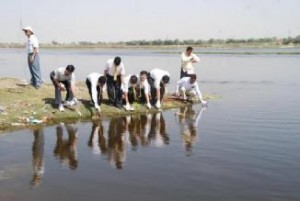Yamuna
Map: Location of water resource projects across river basins in India
Posted on 20 Aug, 2009 03:23 PMThe map indicates that across the main 19 river basins of the country, water resource projects with a total live storage of 174 BCM (Billion Cubic Metres) have been completed, 75 BCM are ongoing, and 132 BCM are being planned.
River basins and river basin organisations in South Asia
Posted on 22 Jul, 2009 03:12 PMAs part of the research study, River Basins and River Basin Organisations in South Asia, done by the Society for Participatory Development Hyderabad, CapNet South Asia (Read More) and Gomukh Environmental Trust for Sustainable Development Pune (Click Here), data about individual river basins has been collected for the river basins in South Asia.
Sewage canal - how to clean the Yamuna - a presentation by Centre for Science and Environment (CSE)
Posted on 16 May, 2009 01:10 PMThis presentation provides an introduction to the book by the Centre for Science and Environment(CSE) titled Sewage Canal: How to Clean the Yamuna”. As per the presentation, several crore rupees have been sunk into plans to clean up the Yamuna.
Memorandum: Scrap Renuka dam project
Posted on 12 May, 2009 11:25 AMForwarded to the Portal by: Himanshu Thakkar, SANDRP
Submission Sent to Prime Minister, DJB, Ministry of Water Resources & HP Govt.
A memorandum demanding the scrapping of the proposed Renuka Dam Project in Sirmaur, Himachal Pradesh was sent to the Prime Minister, Union Minister of Water Resources, the Delhi Jal Board, the Central Water Commission and the Ministry of Social Justice today by concerned environment groups as well as representatives of the dam affected communities. The 5 page detailed submission has made this demand on three basic grounds - technical/conceptual issues, environment implications and the social impacts of the project. Attacking the very root and concept of the project the memorandum highlights the point that the agreement that was signed in May 1994 is no longer valid, as per the opinion of the Union Ministry of Law and Justice, since Rajasthan, one of the parties, did not sign the agreement. The Delhi Jal Board has admitted in response to an RTI application that no options assessment has been done to arrive at the least cost option before taking up the Renuka dam proposal. Without such an assessment, taking up a proposal like the Renuka dam would be completely wrong and inappropriate use of public resources. Moreover, several Studies have proved that Delhi itself is thirsty not because there is shortage of water but actually due to mismanagement and misappropriation of water. According to the Performance Audit report of the Delhi Jal Board for 2008, Delhi has distribution losses of 40 per cent of total water supply which is abnormal and significantly higher than the acceptable norms of 15 per cent prescribed by the Ministry of Urban Development.
Agra: Yamuna river trash cleanup 2009
Posted on 23 Apr, 2009 11:45 AMAhead of the Lok Sabha polls, hundreds of students of several schools along with senior citizens cleaned up Poiya Ghat Sunday morning, picking up rags and used polythene bags, to focus attention on river pollution which candidates of various political parties have chosen to ignore.
Brij Khandelwal, programme convener of the Yamuna Foundation and Rivers of the World Foundation, said apart from students involved in the My Clean Agra initiative, a large number of other voluntary groups and organisations were involved in Sunday's programme which specifically targeted the politicians for failing to clean up the cities and the rivers of India.
"No political party has bothered to say a word about how they would save a dying river and rejuvenate it or restore its original glory," said Subhash Jha and Haridutt Sharma of the Yamuna Foundation for Blue Water.
Invitation for joining URAN PSI group
Posted on 18 May, 2008 10:48 PMSeveral threats have emerged in recent years to the pristine Himalayan rivers of Uttarakhand. These include: (i) the proposed construction of 220 dams (ii) the drying up of rain fed rivers due to deforestation and deforestation of their catchments (iii) release of untreated sewage from river side towns and habitations and (iv) illegal sand mining of river beds.
